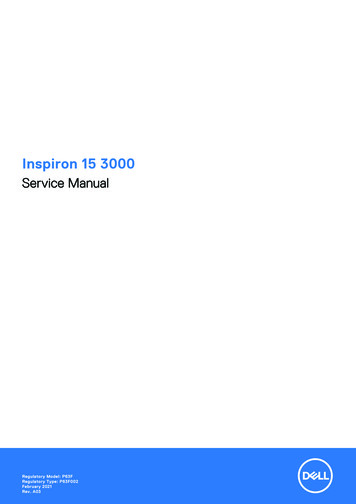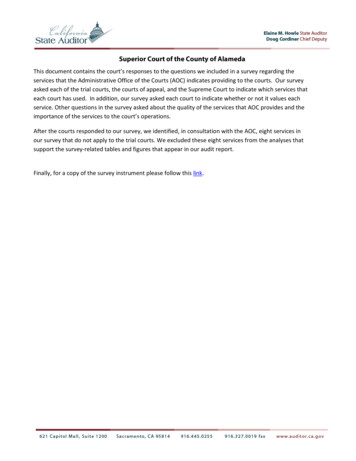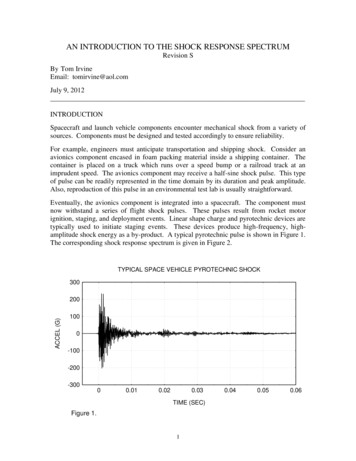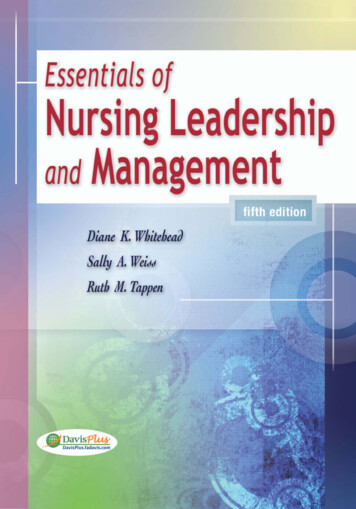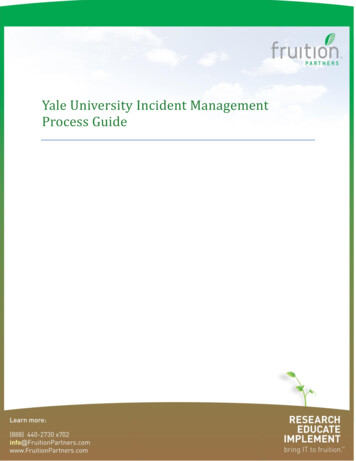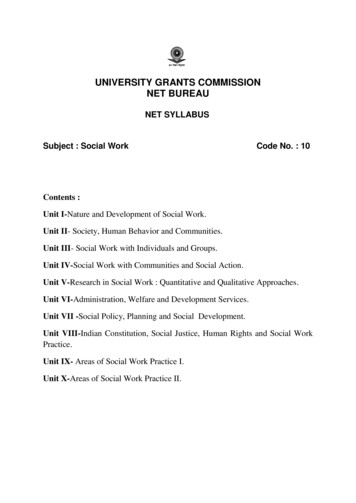
Transcription
9/24/21, 2:59 PMAssessing the world’s 350 most influential food and agriculture companiesUnileverUnilever is a multinational consumer goods company, created in 1929 by the merger ofthe Dutch margarine producer Margarine Unie and the British soap maker LeverBrothers. Today, it is one of the world's largest and oldest consumer goods businesses,producing personal care, home care, food and refreshment products, with a portfolio ofover 400 brands available in 190 countries. Products are manufactured in Unilever’s300 factories and by 700 third-party manufacturers, with an estimated 2.5 billionpeople globally using Unilever's products and brands. Recently, the company opened anew global Foods Innovation Centre on the campus of Wageningen University in theNetherlands.SummaryUnilever tops the first Food and Agriculture Benchmark. It demonstrates leadingpractices and best performance across all measurement areas and addresses keysustainability topics through its Compass Strategy, the successor to its 2010-2020Sustainable Living Plan. It also demonstrates leadership in governance and strategy bylinking executive remuneration to topics across all three benchmark measurementareas. Furthermore, the company leads the benchmark in social inclusion and rankssecond in the nutrition measurement area. In the former it combines commitments andpolicies with leading activities related to paying a living wage and the health and safetyof vulnerable groups. In the latter it reports extensively on ambitious targets forincreasing the availability of healthy foods, and clear and intuitive product labelling.The company also ranks second on the environment, addressing all relevant topics butwith room for improvement when it comes to target setting in areas such as soil healthand agrobiodiversity and optimising the use of fertilisers and pesticides.RANKING POSITIONTOTAL unilever-3/1/7
9/24/21, 2:59 PMAssessing the world’s 350 most influential food and agriculture companiesMeasurement areaGovernance and strategy#1Score10.0 / 10Rank (0-350):#1Measurement areaEnvironment#1Score20.5 / 30Rank (0-350):#2Measurement areaNutrition#1Score17.5 / 30Rank (0-350):#2Measurement areaSocial inclusion#1Score23.7 / 30Rank (0-350):#1SegmentFood and beverage /companies/unilever-3/2/7
9/24/21, 2:59 PMAssessing the world’s 350 most influential food and agriculture companiesSegment ranking summaryAs with the overall ranking, Unilever outperforms all companies in the food andbeverage processing segment of the value chain, the only segment in which it ispresent, demonstrating leadership across the three dimensions of environment,nutrition and social inclusion. The company’s high levels of transparency and disclosureresult in a consistent performance and recognition of its responsibilities across allbenchmark measurement areas.Leading practicesGovernance and strategySustainable development strategyUnilever’s Compass Strategy includes time-bound targets for all the company’smaterial issues, which cover the three benchmark dimensions of environment, nutritionand social inclusion. This builds on Unilever’s 2010-2020 Sustainable Living Plan, withthe company regularly reporting its progress against targets, in addition to outlining adetailed materiality process through which it identifies and prioritises key sustainabilityissues.Governance and accountability for sustainable developmentUnilever’s board of directors has ultimate responsibility for the oversight andimplementation of its sustainability strategy. Furthermore, the company’s remunerationpolicy contains key performance indicators which address topics across all threebenchmark dimensions, demonstrating the company’s appreciation of its holisticresponsibility to address food systems transformation.Stakeholder engagementUnilever undertakes significant stakeholder engagement activities, outlining the groupsof stakeholders with which it engages and key issues raised as part of its materialityprocess. The company also discloses its main strategic as well as operational outcomesof its engagement process, which cover matters relevant to all of the benchmark’sdimensions of environment, nutrition and social inclusion.EnvironmentScope 1, 2 and 3 greenhouse gas emissionsUnilever discloses time-bound targets to reduce its scope 1 and 2 greenhouse gas(GHG) emissions by 100% by 2030, alongside a group-wide target to achieve net-zeroemissions by 2039. The company reports quantitative reductions for its scope 1, 2 and3 GHG emissions in the period between 2010-2020, and further demonstratesleadership by aligning its targets with the Science Based Targets initiative’s 1.5-degreewarming trajectory.Protection of natural terrestrial habitatsUnilever has a time-bound target to achieve a deforestation-free supply chain by 2023,including for its high-risk commodities soya, palm oil and cocoa. The /7
9/24/21, 2:59 PMAssessing the world’s 350 most influential food and agriculture companiesdemonstrates strong progress across all commodities; for instance, its soy supply chainwhere, by the end of 2020, over 90% of soybean oil originated in places with a low riskof deforestation, such as the United States, or from supply chains that aredeforestation-free as verified by recognised industry standards with a segregated chainof custody.Protein diversificationThe company demonstrates a leading commitment to diversifying proteins in itsproduct portfolio through a target to achieve EUR 1 billion in annual sales from plantbased meat and dairy alternatives between 2025-2027. Unilever could furtherstrengthen its position by reporting regularly against this target or quantifying itsplant-based sales target as a percentage of its overall product portfolio.NutritionAvailability of healthy foodsThe company demonstrates leadership in its commitment to increasing the availabilityof healthy foods, disclosing time-bound targets as part of both its 2010-2020Sustainable Living Plan and newly established Compass Strategy. Its latest targetscommit the company to ensuring 70% of products meet its highest nutritional standardby 2022 and to doubling the sales of products that deliver positive nutrition by 2025.In addition, Unilever discloses supporting targets and quantitative data on its efforts toreduce sugar, salt and calories across various product lines.Clear and transparent labellingUnilever demonstrates transparency on the nutritional composition of its productportfolio, committing to regulations regarding back-of-pack labelling in addition tointuitive front-of-pack labelling. The company provides information regarding energyper portion, eight key nutrients and percentage of guideline daily amounts (GDA),reporting that this information was available on 99.7% of its products by the end of2020.Social inclusionLiving wageThe company has a time-bound target to ensure that everyone who directly providesgoods and services to the company earns at least a living wage or income by 2030.Unilever works with the Fair Wage Network to develop its understanding of livingwages and has developed a Framework for Fair Compensation that sits alongside this.The company reports that it has already achieved its commitment to provide a livingwage to its direct employees.Health and safety of vulnerable groupsUnilever recognises the specific health and safety risks to vulnerable groups, citingexamples of migrants working as transporters in its supply chain and female workerson its tea estates in Kenya. In addition to recognising and assessing these risks, thecompany also provides evidence of collaborative support activities to address andmitigate these 7
9/24/21, 2:59 PMAssessing the world’s 350 most influential food and agriculture companiesRisks and opportunitiesEnvironmentFood loss and wasteThe company has a time-bound target to halve food waste in its direct operations by2025 from 2019 levels, as part of the World Resources Institute’s Champions 12.3initiative. It also discloses goals to help tackle this issue in its value chain. However, thecompany has not yet reported against this target, with its next food waste report dueto be published in September 2021, making it unclear whether any progress has beenmade in this area.Water useUnilever disclosed a time-bound target to reduce water withdrawals in its ownoperations to at or below 2008 levels by 2020, reporting a 49% reduction over thereporting period. The company has also set a new target to implement waterstewardship programmes in 100 of its water-stressed locations by 2030 and disclosescurrent proportions withdrawn from these locations. The company could furtherimprove its performance by disclosing where and how it is identifying and prioritisingwater-stressed regions in its supply chain as well as its own operations.Soil health and agrobiodiversity and fertiliser and pesticide useUnilever demonstrates a longstanding commitment to promoting soil health andagrobiodiversity and optimising the use of fertilisers and pesticides through its 2017Sustainable Agriculture Code and recently published Regenerative AgriculturePrinciples. Unilever reports that for its 12 priority crop groups that make up aroundtwo-thirds of the total volume of agricultural raw materials sourced by the company,92% were sustainably sourced in 2020. However, it could further strengthen itscommitment by introducing time-bound targets for the implementation of theseprinciples among its global suppliers and regularly reporting progress against thesetargets.NutritionAccessibility and affordability of healthy foodsThe company discloses several commercial activities designed to increase theaccessibility and affordability of healthy foods. These include the Shakti programme inIndia, through which Unilever has trained 131,000 women in low-income ruralcommunities to act as sales agents in their local villages, and nationwide nutritioninitiatives in the Philippines, South Africa and Italy through its Knorr consumer brand.The company could further strengthen its commitment to addressing this issue bydevising a holistic, group-wide target, particularly in relation to vulnerable groups, andreporting progress against it.Responsible marketingThe company discloses responsible marketing strategies and policies, including aspecific policy for marketing to children, and supports these with various commercialactivities. Unilever could improve its performance further by disclosing its marketingbudgets and the proportion of these that are spent on promoting healthy food 5/7
9/24/21, 2:59 PMAssessing the world’s 350 most influential food and agriculture companiesWorkforce nutritionUnilever’s Lamplighter programme, which supports more than 76,000 employeesacross 75 countries, aims to protect employee health through initiatives focusing ondiet and alcohol consumption, among others. However, the company does not disclosefurther information on workforce nutrition initiatives, including the foods it offers toemployees across its operations.Social inclusionChild and forced labourThe company indicates that it will not use child and forced labour and codifies thesame expectation for its suppliers. It also outlines extensive monitoring processes forits supply chain, utilising both internal and third-party auditing systems, and identifiesspecific high-risk supply chains and geographies. However, the company lacks similardisclosure on how it monitors these issues within its operations.Farmer productivity and resilienceUnilever offers a wide range of programmes that aim to improve farmer productivityand resilience, particularly among smallholders, and reports having trained 834,000farmers on improved agriculture practices since 2010. The company focuses on severalpriority crops, including cocoa, palm oil, coconut and tea. However, while reporting onthe impact of some of these programmes is extensive, such as the Malawi Tea initiative,the company could improve its performance by reporting holistically and in depth onthe impact of all of its support activities.Land rightsThe company is committed to the principle of free, prior and informed consent andcodifies a similar expectation for its suppliers within its responsible sourcing policy. Inaddition, the company has a grievance mechanism that is accessible to externalstakeholders and provides case studies of where it has implemented its approach inRwanda, Côte d’Ivoire and Indonesia. Unilever could improve its performance bydisclosing further details on its remediation process.Core social indicatorsThe core social indicators are part of the social inclusion measurement area. Theseindicators assess societal expectations of business conduct that companies shouldmeet if they aspire to be part of a system transformation that leaves no one behind.Respect human rightsThanks to its publicly available policies and commitments across all key topics, Unileverdemonstrates a benchmark-leading recognition of its responsibility regarding humanrights. The company commits to respecting human rights and the ILO core labourrights, discloses the identification and assessment process for its salient human rightsrisks and the actions it takes to address them. It also has grievance mechanisms inplace for its operations and supply 7
9/24/21, 2:59 PMAssessing the world’s 350 most influential food and agriculture companiesProvide and promote decent workUnilever demonstrates support for collective bargaining. It also meets living wagefundamentals by paying a living wage across its operations and setting a 2030 targetfor its suppliers to pay a living wage. The company recognises its responsibility inrelation to health and safety, working hours, workforce diversity and gender equalitybut could strengthen its performance with more disclosure on these key topics.Act ethicallyBy disclosing policies and information on personal data protection, tax, and briberyand corruption, Unilever demonstrates a holistic commitment to ethical businessconduct.More about the companyHeadquartersLondon, United KingdomFood and agriculture revenue USD21,917,045,500Group revenue USD59,068,181,900Onwnership structurePublicly listedNumber of s company is part of the SDG2000, the2.000 most influential /7/7
Unilever demonstrates a longstanding commitment to promoting soil health and agrobiodiversity and optimising the use of fertilisers and pesticides through its 2017 Sustainable Agriculture Code and recently published Regenerative Agriculture Principles. Unilever reports

